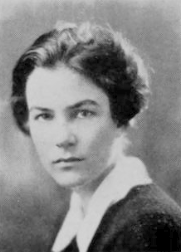Rosemary Thomas
Rosemary Thomas | |
|---|---|
 In the Smith College yearbook, 1923 | |
| Born | February 16, 1901 |
| Died | April 7, 1961 (aged 60) New York, New York, US |
| Education | |
| Occupation(s) | Poet, teacher |
Rosemary Thomas (February 16, 1901 – April 7, 1961) was an American poet and teacher, known for her book of poems Immediate Sun, which won the Twayne First Book Contest in 1951.
Education
Thomas graduated from Smith College in 1923. In 1950, she received a Master of Arts degree from Columbia University for an essay on Lawrence Durrell, the British poet and novelist.[1]
She taught creative writing at various schools including Spence School and Brearley School in New York, Shipley School in Bryn Mawr, Pennsylvania and Oxford School in Hartford, Connecticut.[1]
Literary career
In 1951, Thomas won the Twayne First Book Contest for her only book of poems, Immediate Sun.[2] The book had a foreword written by Archibald MacLeish, who described her poems as having "a common quality, a characteristic idiom, and inflection the reader would recognize again as a man recognizes the inflection of a decisive voice".[3] The book includes a poem about her brother-in-law, Canadian tennis star J.F. Foulkes, entitled "The Colonel".[4] Her poems were also published in the New York Times, The New Yorker, and in other magazines.[1][5]
The final years of her life, which she devoted entirely to her writing, were divided between her homes in Duxbury, Massachusetts, and New York City, where she died in 1961.[3][6]
Legacy
A posthumous collection of her poems was published in 1968, titled Selected Poems of Rosemary Thomas, with a foreword by Mark van Doren. He wrote: "Rosemary Thomas's poems will last, as all things excellent do, for the simple reason that nothing like them exists elsewhere."[3]
In 2004, her poem "The Elephants Pass Carnegie Hall" was set to music by composer David Leisner in his piece A Timeless Procession. It was first performed in 2011 at Symphony Space in New York City.[7][8] The program for the performance records that Leisner discovered Thomas's poems by chance at a library book sale in the late 1980s. He describes her as a "lyrical, imaginative, spiritual-minded poet whose work simply begged me to set it to music".[9]
The English Language and Literature Department at Smith College awards the Rosemary Thomas Poetry Prize annually to the best poem or group of poems.[10]
References
- ^ a b c "Rosemary Thomas, Poet and Teacher". The New York Times. April 6, 1961. Retrieved October 7, 2020. (subscription required)
- ^ "Poetry Prize Awarded: Rosemary Thomas Wins Twayne First Book Contest". The New York Times. January 10, 1951. Retrieved October 7, 2020. (subscription required)
- ^ a b c Thomas, Rosemary (1968). Selected Poems of Rosemary Thomas. New York: Twayne Publishers.
- ^ Thomas, Rosemary (1951). Immediate Sun. New York: Twayne Publishers, Inc. p. 49.
- ^ "Search – Rosemary Thomas". New Yorker. Retrieved October 7, 2020.
- ^ Written at New York. "Rosemary Thomas, Poet, Teacher, 60". The Jersey Journal. Jersey City, New Jersey. April 10, 1961. p. 2. Retrieved September 22, 2024 – via Newspapers.com.
- ^ "Rosemary Thomas". Song of America. Retrieved October 7, 2020.
- ^ "Classical Music/Opera Listings for March 18–24". New York Times. March 17, 2011. Retrieved October 7, 2020.
- ^ "A Timeless Procession". Song of America. Retrieved October 7, 2020.
- ^ "Prizes & Awards". Smith College. Retrieved October 7, 2020.
External links
- Selected Poems of Rosemary Thomas at Google Books
- Rosemary Thomas papers, 1930–1966 at Columbia University Libraries
- Search results for Rosemary Thomas, poems published in the New Yorker between 1954 and 1961
- 1901 births
- 1961 deaths
- American women poets
- 20th-century American poets
- 20th-century American women writers
- Smith College alumni
- Columbia University alumni
- Poets from Massachusetts
- Schoolteachers from Pennsylvania
- Schoolteachers from New York (state)
- People from Duxbury, Massachusetts
- Schoolteachers from Connecticut
- Poets from New York City
- 20th-century American educators
- 20th-century American women educators
- The New Yorker people
